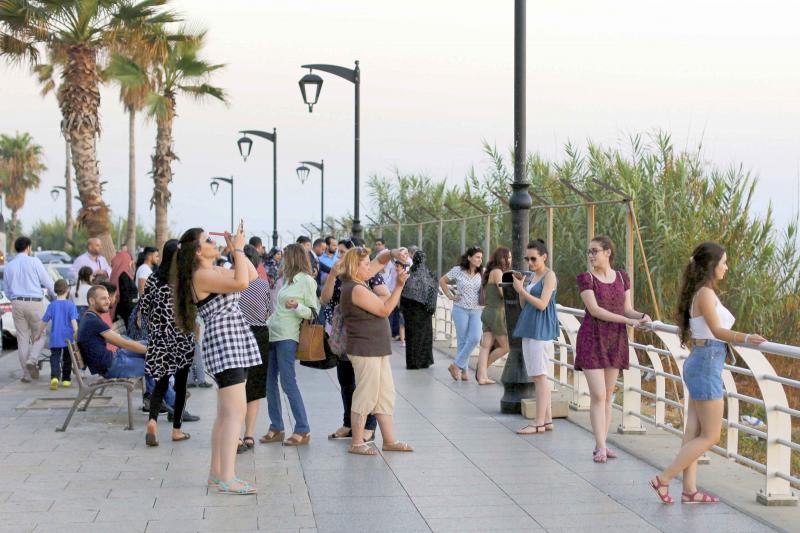Lebanon fails to woo Gulf tourists despite lifting of travel ban
سمر قعدي: لبنان يفشل في جذب السياح العرب رغم رفع الدول الخليجية الحظر على سفر رعاياها إليه
Samar Kadi/The Arab Weekly/August 25/2019
BEIRUT – Saudi Arabia’s lifting of a travel ban to Lebanon in February raised expectations for a booming summer tourism season and the return of Arab Gulf tourists but, despite 8% growth in the tourism sector, figures were highly disappointing, said Pierre Achkar, president of the Lebanese Federation for Tourism Industries and the Lebanese Hotel Association.
“Frankly, we had anticipated a larger number of visitors to come to Lebanon during and before the Eid al-Adha holiday, especially from Saudi Arabia and other Gulf countries. Unfortunately, the Gulf people did not come for the summer,” Achkar said.
“There was an improvement in the number of visitors (from the Gulf) this year compared to the previous years but we have noticed that their stay is becoming shorter and they are not bringing their whole family with them as they used to do.
“We have always stressed that the backbone of tourism in Lebanon are Arab tourists, especially visitors from the Gulf countries. When Gulf tourists used to visit Lebanon, their average stay was ten days and sometimes a month or more, especially those who own properties here.
Moreover, the Gulf tourists spend much more than the average tourist,” Achkar said.
For decades, Lebanon has been reliant on the Gulf market for tourism. Gulf visitors started returning in small numbers over the previous year and this year but it was nowhere near the numbers in 2010 and before.
A combination of political instability, the Syrian war next door and regional tensions shied away Arab tourists from Lebanon in the past eight years, said Achkar, who is also the mayor of the mountain village Broumana, a popular summer retreat for Gulf tourists.
He cited tourists’ concerns over Hezbollah’s threat to side with Iran in case of a clash with the United States and its Arab allies, including Saudi Arabia, and the Druze incident in the mountain village of Qabrshmoun in which two people were killed in June.
“What is being circulated in the international media about instability and potential armed conflicts in the country is extremely harmful. Everybody has access to the news these days and what they are reading and seeing is discouraging for tourism, especially for Gulf tourists, Achkar said.
“The incident of Qabrshmoun triggered all kinds of rumours and fears about imminent civil war, sectarian conflict and a Christian-Druze rift. When they (Arab tourists) hear such news, they would think: ‘Why should I go there?’” Achkar said.
Lebanese Tourism Minister Avedis Kedanian has stressed the security concerns of tourists bound to visit Lebanon after the mountain incident, noting that tension has struck Lebanon at a time when its tourism had started to show recovery signals.
“I have been sickened by what was happening on the ground because the tourism sector is already suffering and if politicians stop flogging themselves, only then we will be able to overcome the crisis,” Kedanian declared, lamenting how political rhetoric escalated against the backdrop of the Qabrshmoun incident.
The minister noted, however, that there is a remarkable growth — 30% — in the number of tourists from European countries than the previous year and that the number of tourists from Saudi Arabia doubled to 44,000 tourists in the first half of 2019 compared to last year.
Achkar said a sample survey conducted by the municipality in the area of Broumana showed that none of the Saudi owners have rehabilitated their houses and many did not even check on their properties.
He argued that Gulf nationals have likely developed other preferred travel destinations during their almost 9-year absence from Lebanon, while the younger generation, who have grown up travelling to the likes of London, Dubai and Istanbul, might conceivably pass on visiting Lebanon.
“Some have not set foot in Lebanon for the past seven or nine years,” Achkar said. “They have probably found alternative destinations and got used to other holiday countries such as Turkey, Cyprus, Greece and Spain, which offer them great incentives. They even offer them permanent residency in return for buying properties and investing in the country.”
The Lebanese Ministry of Tourism said the sector recorded 8% growth in the first seven months of 2019, compared to the same period last year. Hotel occupancy in Beirut was about 70% and 40-50% outside the capital.
“This not enough for the tourism sector to recover,” Achkar said. “We had expected and hoped for a 25% growth and a minimum of 90% occupancy in Beirut and more than 70% outside.”
He said returns from the tourism sector have dropped by more than 35% since 2009-10.
“We have been suffering losses for the past nine years. We need at least two to three very good seasons to recuperate and compensate the losses. Definitely, the season was not up to our expectations and ambitions,” Achkar added.
















